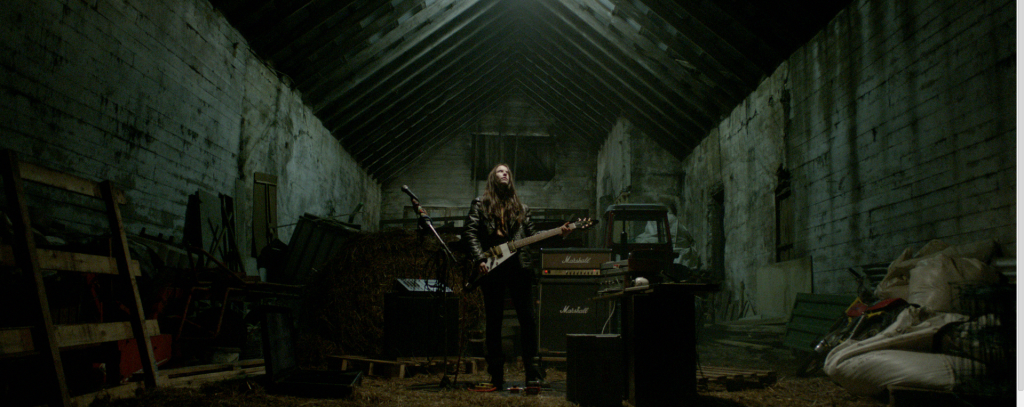For a genre predicated on outlandish shows of hypermasculinity, heavy metal comes second only to goth as the form of music whose practitioners and fans most regularly air their feelings of sadness and isolation. From the Tolkien-cribbing lyrics of Led Zeppelin straight through to the church-burning antics of Norwegian black metal, metal has been the stereotypical soundtrack of generically literate loners with an axe to grind against a world they don’t understand and that doesn’t understand them. As a catharsis, it can be a healthy venting of young id, and just as dangerous for the same reason.
Ragnar Bragason’s Metalhead examines both sides of this relationship to the music. It begins with 12-year-old Hera (Diljá Valsdóttir) witnessing her brother’s accidental death on her family’s milk farm, an event that so shocks the girl that she burns all of her old clothes and takes her brother’s metal albums and wardrobe as her own to retain some piece of him. Years later, the young adult Hera (Þorbjörg Helga Dyrfjörð) has become a metal obsessive, poring over fanzines, making her few friends mixtapes of Priest and Dio that the more musically conservative will never listen to, and, in a scene that would not look out of place in a Candlemass video, puts an amp by her brother’s grave to serenade him with buzzsaw riffs and squealing lines. Still living with her parents, Hera milks the family cows and shovels their crap or takes part-time work at a slaughterhouse, all the while listening to metal on her Walkman at volumes typically reserved for wind tunnels or white noise sensory deprivation chambers.
These are broad establishing strokes, but soon the film settles into a series of more thoughtful observations of Hera and her surroundings. Hera’s antisocial behavior is contextualized by her overriding sense of being misunderstood, particularly when a new, hip priest arrives in town. The priest comes off like an inverted cliché, sporting a tattoo of Iron Maiden’s Eddie mascot and raving about Venom’s live shows (all the while talking about a certain long-haired dude who knew a thing or two about the hardships of life and hung out with outcasts). But his presence ignites an uncontrollable excitement in the young woman, at last blessed with someone in her life who shares her interests.
That feeling of togetherness leads Hera to become sexually forward with the man, who is not forbidden from relationships but still shrinks from her aggressive affections. Her clumsy shows of attraction contrast with her childhood friend Knútur’s (Hannes Óli Ágústsson) own awkward advances upon her; where Hera believes a connection to her true self automatically equates to reciprocal feelings, Knútur pretends to enjoy her music to get close to her. Both reflect a naïve teenage understanding of love, and by connecting Knútur’s general sense of longing to Hera’s more specific kind, the film starts to tie the ostensibly out-there nature of her tastes with common impulses and feelings.
Metalhead boasts a great soundtrack of genre classics (the only real obscurity is from a band called Teaze), and August Jakobsson’s cinematography highlights the Nordic chill that seems to incubate the most extreme metal, but the film is at its best in these moments of broader connection. Ingvar Eggert Sigurðsson and Þórunn Arna Kristjánsdóttir are tremendous as Hera’s parents, dealing with their grief in their own insular, stultifying way, and the simultaneously patient but irritated townspeople who interact with Hera paint her behavior as a more desperate form of general teenage rebelliousness.
And for all of the film’s somber melancholy and outright rage, it also has a wry humor to it, be it Hera having to remove an improbable number of belts when undressing for sex or the setting and audience of her first concert when she finally gets the courage to perform. For a film that threatens to topple over into the dark realm of black metal when Hera reaches her lowest, Metalhead is akin to Elvis on The Ed Sullivan Show, a legitimization of something dangerous that may dull its edge but also recognizes it as valid expression. If nothing else, Megadeth have never seemed so endearing and warm as they do when employed in the final scene.






















One thought on “ATLFF Review: “Metalhead””
Given the review generally reads as positive, why the B-? It was a solid little film with very few serious flaws and a lot of things going for it.